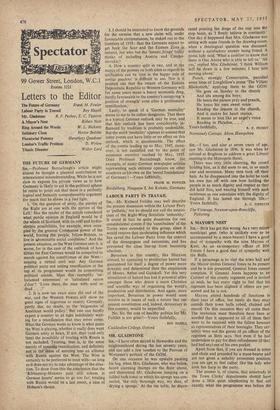Letters to the Editor
The Future of Germany Frank M. Fowler Labour Party in Travail Roy Hazed Mr. Gladstone R. F. [Wiley, F. C. Tippetts A Mayor's Nest Robert Nott Ring Around the Words W. L. Ricketts Salisbury Close Hector Bolitho Piscatorial Potency Humphrey Quadrant London's Traffic Problem D. Wylow Titanic Disaster Walter Lord THE FUTURE OF GERMANY
SIR,—Professor Barraclough's article might almost be thought a planned contribution to international misunderstanding. While he is not slow to express his private views as to how Germany is likely to act in the political sphere he omits to point out that there is a perfectly logical and humanly comprehensible argument for much that he shows in a bad light.
1. 'On the question of unity, the parties of the Right are at one with the parties of the Left.' Has the reader of the article considered what, public opinion in Eoglarid would be if the whole of Scotland, with its coal and hydro- electric possibilities, for example, were occu- pied by the greatest Communist power of the world, forcing the people, fellow-Britons, to live in abominable social conditions? And the present situation, as the West German sees it, is worse, for in the cast of the outbreak of hos- tilities the East German would be compelled to march against his countryman of the WeiSt- causing a virtual civil war. Any German political party not setting reunification at the top of its programme would be committing political suicide. Mpst this exemplify 'un- balanced extremism' or 'calculated raison d'etat'? 'Lives there the man with soul so dead . . .?'
2. It is now ten years since the end of the .war, and the Western Powers still show no great signs of eagerness to reunify Germany, partly due, no doubt, to the 'exigencies of American world policy.' But ode can hardly expect a country to sit tight indefinitely wait- ing for a reunification that may never come.
What the German wants to know is what game the West is playing, whether it really does want German unity at heart.'lf not, then (and only then) the possibility of treating with Russia is not excluded. Treating, that is, in the sense merely of ensuring reunification, and definitely not in the sense of entering into an alliance 'with Russia against the West. The West is certainly to, be preferred to treat with—so long as it does not try to take advantage of the situa- tion. To draw from this the conclusion that the 'Ribbentrop-Molotov pact still echoes in German hearts' seems to go too far; treating with Russia would be a last resort, a case of Hobson's choice. 3. I should be interested to know the grounds for the surmise that a new claim will, under favourable circumstances, be staked out to the frontiers of 1939: that the Germans expect to get back the Saar and the Eastern Zone is natural, but who but the 'lunatic fringe' today thinks of including Austria and Czecho- slovakia?
4. How a country split in two, and at the mercy of the poWers on both sides as regards its unification can be 'cast in the happy role of tertius gardens' is, difficult to see. Nor is it pointed out that the return of \ the Eastern Democratic Republic to Western Germany will for some years mean a heavy economic drag, hardly favourable to the country's occupying 'a position of strength' even after a problematic reunification.'
Lastly, to speak of a 'German mentality' seems to me to be rather dangerous. That there is a typical German outlook may be true, and that this outlook has been considerably in- fluenced by tradition is probably undeniable. But the word 'mentality' appears to assume that outer events can have little or no effect on this outlook, which is questionable. The effect of the events leading up to May, 1945, more- over, is not cancelled out by the point of economic recovery reached by May, 1955. Does Ptofessor Barraclough know, for example, of many German newspaper articles representing such extreme opinions on other countries as his own on the 'moral foundations' of Germany?—Yours faithfully, FRANK M. FOWLER Heidelberg, Neugasse 8, bei Kohnle, Gerrhany


































 Previous page
Previous page